| Srl | Item |
| 1 |
ID:
116112
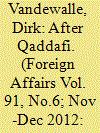

|
|
|
|
|
| Publication |
2012.
|
| Summary/Abstract |
The September 11 killing of the U.S. ambassador to Libya, Christopher Stevens, and three other Americans during an attack by an angry mob on the U.S. consulate in Benghazi has concentrated the world's attention on the problems of post-Qaddafi Libya. The riots showcased both the power of radical Islamist militias and the inability of the government in Tripoli to provide security and maintain order across the country. Lawlessness and corruption are pervasive, and fundamental questions about the structure and operation of Libyan political and economic institutions remain unanswered. None of this, however, should obscure the fact that the larger story about the new Libya is surprisingly positive. The worst-case scenarios commonly predicted a year ago have not emerged, and there are actually grounds for guarded optimism about the future.
|
|
|
|
|
|
|
|
|
|
|
|
|
|
|
|
| 2 |
ID:
110089
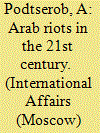

|
|
|
|
|
| Publication |
2011.
|
| Summary/Abstract |
THE WAVE OF POPULAR RIOTS which swept the Middle East and North Africa and which remains the key factor behind the regional developments engulfed not only the poor countries but also those which coped both socially and economically.
Between 2004 and 2009, for example, Tunisia increased per capita income from 3.5 thousand Tunisian dinars ($2.7 thousand) to 5 thousand TND ($3.9 thousand); its middle class (60% of population) accounted for 83% of total consumption; 80% were house owners; 21% had cars. In oil-rich Libya the year 2011 began very much as usual: foodstuffs and money were distributed among the poor; some families received free car coupons practically on the eve of the uprising.1
|
|
|
|
|
|
|
|
|
|
|
|
|
|
|
|
| 3 |
ID:
118883
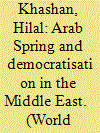

|
|
|
| 4 |
ID:
115057
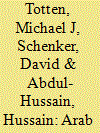

|
|
|
| 5 |
ID:
107213


|
|
|
| 6 |
ID:
092490
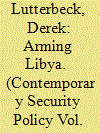

|
|
|
|
|
| Publication |
2009.
|
| Summary/Abstract |
Long isolated and shunned by many countries for its support of terrorist activites, Libya has over recent years re-emerged as an increasingly important player on the international scene.
|
|
|
|
|
|
|
|
|
|
|
|
|
|
|
|
| 7 |
ID:
183954
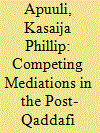

|
|
|
|
|
| Summary/Abstract |
Since the end of the revolution that toppled the rule of Muammar Qaddafi in October 2011, Libya has never known peace. The country descended into civil war with different factions contending for control. In this milieu, the United Nations attempted to mediate an end to the crisis but its efforts have failed to gain traction partly as a result of other mediation initiatives undertaken by several European actors. Sub-regional and continental organizations, including the Arab Maghreb Union (AMU) and the African Union (AU) respectively, that should have taken the lead in the mediation have been absent. Meanwhile, continued fighting has hampered a mediated settlement, and terrorist groups such as the Islamic State (IS) and al-Qaeda have taken advantage of the situation to establish a presence in the country. In the end, rather than ending the crisis, Libya has provided the ground for competing mediation processes which have prolonged the crisis.
|
|
|
|
|
|
|
|
|
|
|
|
|
|
|
|
| 8 |
ID:
109552
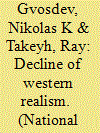

|
|
|
|
|
| Publication |
2012.
|
| Summary/Abstract |
WHEN OPERATION Odyssey Dawn commenced in the skies over Libya on March 19, 2011, it represented a major turnaround in U.S. policy. Only nine months earlier, U.S. ambassador Gene Cretz had characterized the regime as a "strategic ally" of the United States due to Libyan cooperation on counterterrorism and nonproliferation issues (and its halting, tentative steps toward greater openness). Now Libya found itself on the receiving end of conventional U.S. military power for repressing a civilian population agitating for governmental change.
|
|
|
|
|
|
|
|
|
|
|
|
|
|
|
|
| 9 |
ID:
110320
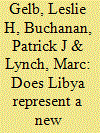

|
|
|
|
|
| Publication |
2012.
|
| Summary/Abstract |
In the last issue of The National Interest, we ran a cover story by Nikolas K. Gvosdev and Ray Takeyh positing that America's military role in helping bring down Libyan president Muammar el-Qaddafi represented a significant new era in the country's foreign policy-the ascendancy of a doctrine that placed far greater emphasis on humanitarian considerations as a rationale for military interventions overseas. This was a provocative thesis, and the authors' probing analysis and tight argumentation rendered it one that we were proud to display prominently in our journal. But it occurred to us that it certainly didn't represent the last word on the subject of the future of American foreign policy. And so we invited three prominent international-relations thinkers-Leslie H. Gelb, Patrick J. Buchanan and Marc Lynch-to weigh in with their own thoughts on the subject. Their musings follow, along with a final response from Gvosdev and Takeyh, who get the last word as a reward for introducing the subject in the first place.
|
|
|
|
|
|
|
|
|
|
|
|
|
|
|
|
| 10 |
ID:
108852
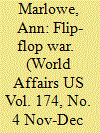

|
|
|
| 11 |
ID:
147716
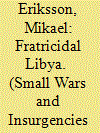

|
|
|
|
|
| Summary/Abstract |
This study explores the development of Libya’s security situation following the so-called Arab Spring in 2011 up to March 2016. It provides an overview of Libya’s main warring parties and the struggles they are engaged in. The analysis covers both domestic groups and the main external stakeholders. The study finds that the security dynamics are changing quickly and that Libya has many political hurdles and security challenges to overcome before a more durable situation of stability can be achieved.
|
|
|
|
|
|
|
|
|
|
|
|
|
|
|
|
| 12 |
ID:
183762
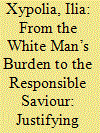

|
|
|
|
|
| Summary/Abstract |
In recent years, there has been renewed interest in conceptualising the political nature of human rights as well as intense debate over the precise nature of Western biases in the whole project. Spurred by the fresh renewal of radical theory, a growing body of literature explores the role that racialized power hierarchies have played in the human rights project through the Responsibility to Protect Doctrine. Drawing from critical human rights scholarship, this article explores the way human rights have been employed as a legitimising discourse for justifying military intervention in Libya. In doing so, it illustrates the Eurocentric conceptualisation of power, power hierarchies and subjectivities.
|
|
|
|
|
|
|
|
|
|
|
|
|
|
|
|
| 13 |
ID:
102869
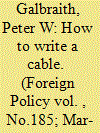

|
|
|
| 14 |
ID:
108524
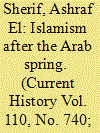

|
|
|
| 15 |
ID:
110153
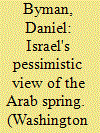

|
|
|
| 16 |
ID:
112814
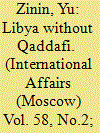

|
|
|
|
|
| Publication |
2012.
|
| Summary/Abstract |
IN LIBYA, the supreme power in October 2011 passed into the hands of the National Transitional Council (NTC), which declared the country's liberation from Muammar Qaddafi's dictatorship.
With his removal the authoritarian model he called Jamahiriya ("state of the masses") lost its top leadership. The social and political system, crafted specifically for the leader, had ensured the governability and development of a vast country with a small population and riven by tribal loyalties as a single state for 42 years.
In autumn 2011, the NTC published a Roadmap for Democracy in Libya with a 20-month countdown to an election for a Constituent Assembly to adopt a new Constitution and other laws. After the Assembly's election, NTC is to be dissolved.
|
|
|
|
|
|
|
|
|
|
|
|
|
|
|
|
| 17 |
ID:
108527
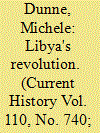

|
|
|
| 18 |
ID:
118889
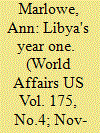

|
|
|
| 19 |
ID:
122087
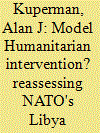

|
|
|
|
|
| Publication |
2013.
|
| Summary/Abstract |
NATO's 2011 humanitarian military intervention in Libya has been hailed as a model for implementing the emerging norm of the responsibility to protect (R2P), on grounds that it prevented an impending bloodbath in Benghazi and facilitated the ouster of Libya's oppressive ruler, Muammar al-Qaddafi, who had targeted peaceful civilian protesters. Before the international community embraces such conclusions, however, a more rigorous assessment of the net humanitarian impact of NATO intervention in Libya is warranted. The conventional narrative is flawed in its portrayal of both the nature of the violence in Libya prior to the intervention and NATO's eventual objective of regime change. An examination of the course of violence in Libya before and after NATO's action shows that the intervention backfired. The intervention extended the war's duration about sixfold; increased its death toll approximately seven to ten times; and exacerbated human rights abuses, humanitarian suffering, Islamic radicalism, and weapons proliferation in Libya and its neighbors. If it is a "model intervention," as senior NATO officials claim, it is a model of failure. Implementation of R2P must be reformed to address these unintended negative consequences and the dynamics underlying them. Only then will R2P be able to achieve its noble objectives.
|
|
|
|
|
|
|
|
|
|
|
|
|
|
|
|
| 20 |
ID:
103976
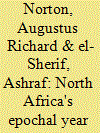

|
|
|
|
|
| Publication |
2011.
|
| Summary/Abstract |
Uprisings in North Africa have electrified the world and inaugurated a new era in the region, but their outcomes are uncertain. The old order could yet prove resilient.
|
|
|
|
|
|
|
|
|
|
|
|
|
|
|
|